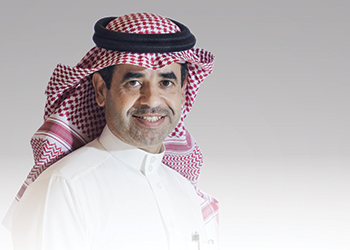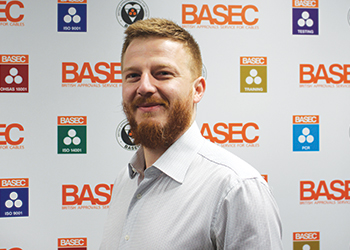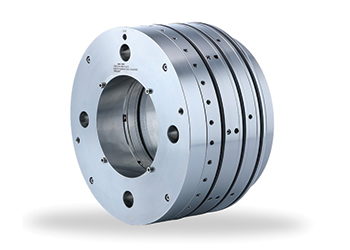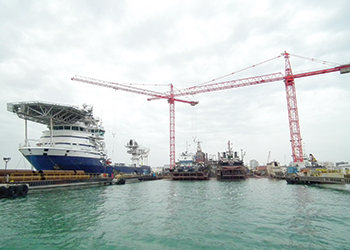
 Al-Faqeer ... leading growth
Al-Faqeer ... leading growth
Sadara is making strong localisation efforts and is enhancing its procurement process to support local manufacturers and SMEs and develop their capabilities
The contribution of the Sadara Chemical Company in Saudi Arabia’s Jubail Industrial City II in supporting the Kingdom's strategy for chemical industries is enabling many downstream manufacturing industries and attracting investors in this sector from inside and outside.
Dr Faisal Al Faqeer, the CEO of Sadara, said the company has so far succeeded in signing nine agreements with various local and international companies, and four companies are already building their plants in the adjacent PlasChem Park complex, to produce finished materials that rely on raw materials from Sadara. He described this as "a manifestation of the Kingdom's Vision 2030 and the purpose behind establishing major national projects like Sadara".
Developed as a joint venture between Saudi Aramco and Dow Chemical Company, Sadara is in many ways a Kingdom first; 14 of its 26 manufacturing plants are completely new to the Kingdom. The plants annually produce more than 3 million metric tonnes of value-adding chemicals and plastics through unique technologies.
 |
The company is adding new value chains to transform the Kingdom’s existing chemical landscape, Sadara said in its sustainability report for 2019. The complex is introducing the first polyurethane (isocyanates and polyols) plants to the Kingdom. Other plants produce elastomers, ethylene amines, propylene glycol, butyl glycol ether and solution polyethylene, among other chemicals.
Sadara is making strong localisation efforts and is enhancing its procurement process to support local manufacturers and SMEs and develop their capabilities. Last year, Sadara adopted six KPIs to measure and report its local content contribution. In 2019, Sadara acquired 80 per cent of its required materials and services came from local sources. Additionally, 85 per cent of its total spend since 2011 has gone towards local suppliers.
In this regard, Sadara last month signed an MoU with the Saline Water Conversion Corporation (SWCC) for supply of concentrated sodium chloride (salt) brine to Sadara plants through pipelines.
"Using pipelines rather than trucks will contribute to maintaining road safety as well as reducing costs. Sadara also aims to conserve natural resources and protect the environment by finding alternatives to solid natural salt and trucks for transportation currently in use," said Al Faqeer.
Separately, Sadara signed a 25-year agreement with Saudi Railway Company (SAR) for using trains to transport liquid and solid products and containers as a primary means of transportation for the company. Al Faqeer said it was is a unique agreement, the first of its kind in the region involving rail transportation of liquid chemicals and similar products.
The arrangement will also replace about 200,000 truckloads of Sadara products annually to Jubail’s ports, in addition to protecting the environment as a result of reducing harmful emissions by 73 per cent.
Sustainability is another key focus at Sadara. Al Faqeer said the sustainability strategy will remain focused on three foundations: Sadara’s corporate strategy, Saudi Arabia’s Vision 2030 and Sustainable Development Goals (SDGs).
Sadara is also the first Saudi Aramco joint venture to obtain Responsible Care RC14001 certification, which demonstrates its commitment to sustainability as an essential part of business.
In 2019, Sadara established the Resources Optimisation Committee, an initiative by the sustainability team, to facilitate the monitoring and optimisation of the four footprint elements in Sadara: Greenhouse Gas (GHG) emissions, Energy and Water consumption and Material effectiveness.
Sadara’s energy strategy is focused on implementing company-wide energy policies and developing the required competencies by certifying energy auditors and enacting an energy manager who can help the organisation to improve energy performance.
In 2019, major energy project implemented in the aniline plant led to an energy saving of SR2.3 million. Another major energy project implemented in the Toluenediamine (TDA) plant led to an energy saving of SR1.3 Million
Sadara’s waste management programme uses cutting-edge technology to effectively reduce waste. A total of 600 hazardous and nonhazardous waste streams have been identified and profiled.
In 2019, the company saved nearly SR13.5 million on waste management and logistics costs. Meanwhile, it safely disposed over 25,0000 tonnes of hazardous and non- hazardous waste, in addition to safely recycling nearly 11,000 tonnes of hydrocarbons, mixed recyclables, TDI tar and sulfuric acid.
Sadara currently has about 3,600 employees, more than 71 per cent of whom are Saudis. The company aims to continue such rates while maintaining a diverse selection of qualified professionals and empowering more women at work in line with Vision 2030.






















































































